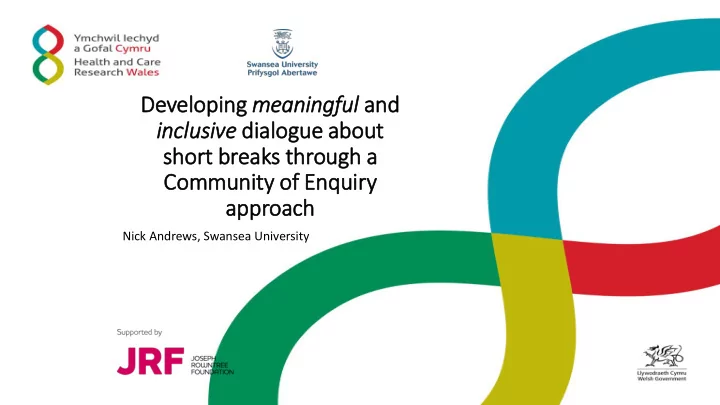

Developing meaningful and in inclusive dia ialogue about short breaks through a Community of Enquiry iry approach Nick Andrews, Swansea University
A reminder of today’s theme - unblocking the potential in our communities
The Developing Evidence-Enriched Practice (DEEP) project • An appreciative and collaborative action research, service and workforce development project (Andrews et al 2015) • Involving older people with high support needs, carers, practitioners, managers and researchers • Six project sites – 5 in Wales and 1 in Scotland • Responding to the 7 Challenges of the JRF programme A Better Life (Blood 2013)
The Seven Challenges of A Better Life • Promote a more positive image of old age • See the person behind the label or diagnosis • Recognise that all support is founded in meaningful and rewarding relationships • Enable the opportunity for older people to give as well as receive • Share responsibility with older people (e.g. in decision making and working together to promote collective well-being) • Strengthen the individual and collective voice of older people • Recognise that big innovative changes can be good but also that ‘little things’ can make big difference
DEEP project work in Neath and Port Talbot • A focus on respite, in response to poor experiences of this service, e.g. Ros’s story • Exploring the complexity of interdependent caring relationship and drawing on associated research (Ryan et al 2008), lived experience and tacit knowledge • The Carer Indices – balancing difficulties, satisfactions and coping strategies (McKee et al 2009)
Outcomes and outputs • ‘No them and us’ – improved relationships and mutual support between everyone involved • A recognition of the importance of good conversations and creativity • ‘Craft and chat’ events • ‘See me not my shell’ poem • New service developments
How we went about achieving this We used: • Experience Based Co-Design (EBCD) techniques to gather evidence and share evidence (Bate & Robert 2007) • Dialogue learning techniques, including Exploratory Talk (Mercer and Littleton 2007) and Community of Enquiry (www.sapere.org.uk )
A lesson from Fawlty Towers and EBCD • In general, people do not like to complain • People who are reliant on others are even less likely to complain • The danger of satisfaction surveys and the importance of capturing, sharing and exploring experiences (Bate & Robert 2007)
The hospital satisfaction survey • ‘Overall , did you feel you were treated with respect and dignity while you were in hospital ?’ … the patient ticked the box ‘Yes, always ’ • ‘ Overall, how do you rate the care you received ?’ … the patient ticked the box ‘Excellent’. (Locock et al. 2014)
The EBCD conversation: • ‘The other thing I didn’t raise and I should have done because it does annoy me intensely, the time you have to wait for a bedpan . . . elderly people can’t wait, if we want a bedpan it’s because we need it now. I just said to one of them, ‘I need a bedpan please’. And it was so long bringing it out it was too late. It’s a very embarrassing subject, although they don’t make anything of it, they just say, ‘Oh well, it can’t be helped if you’re not well’. And I thought, ‘Well, if only you’d brought the bedpan you wouldn’t have to strip the bed and I wouldn’t be so embarrassed ’. (Locock et al. 2014)
An example from N&PT • What feelings come mind when you The experience ... think about a time you used or • ‘...He just came out with it – out of talked about respite care? the blue, “I will go into a care home, into respite for one week” – to give me a break and I was so upset about it. He hadn’t mentioned anything about it to me, but he felt he was a burden on me. I couldn’t answer. I said “why on earth did you say that?” He said, “Well you know it is too much for you”. But it’s not too much for me and it really upset me… it was awful’
Going beyond being moved by stories
Three types of talk and the elephant metaphor of reality • Disputational talk • Cumulative talk • Exploratory talk • Playful talk Mercer & Littleton (2007)
The 11 steps of Community of Enquiry • Getting set • Presentation of stimulus • Individual reflection • Thinking time • Question making • Question airing • Question choosing • First words • Enquiry • Last words • Review (www.sapere.org.uk )
Workshop exercise and discussion • Exploring some of the elements of Community of Enquiry within the limitation of the group.
References • Andrews, N., Gabbay, J., LeMay , A., Miller, E., O’Neill, M. and Petch, A. (2015) Developing Evidence Enriched Practice in Health and Social Care with Older People , York: Joseph Rowntree Foundation (available at: https://www.jrf.org.uk/report/developing-evidence- enriched-practice-health-and-social-care-older-people ) • Bate,P and Robert ,G (2007) Bringing user experience to health care improvement: the concepts, methods and practices of experience-based design. Oxford: Radcliffe Publishing. • Blood, I (2103) A better life: valuing our later years, York: Joseph Rowntree Foundation (available at: https://www.jrf.org.uk/report/better-life-valuing-our-later-years ) • Locock L, Robert G, Boaz A, Vougioukalou S, Shuldham C, Fielden J, et al. (2014) Testing accelerated experience-based co-design: a qualitative study of using a national archive of patient experience narrative interviews to promote rapid patient-centred service improvement. Health Serv Deliv Res, 2(4) • McKee, K, Spazzafumo, L, Nolan, M, Wojszel, B, Lamura, G and Bien, B (2009) Components of the difficulties, satisfactions and management strategies of carers of older people: A principle component analysis of CADI-CASI-CAMI. Ageing and Mental Health , 13(2): 255-264 • Mercer, N. and Littleton, K. (2007) Dialogue and the Development of Children’s Thinking. London: Routledge. • Ryan, T, Nolan, M, Reid, D and Enderby, P (2008) Using the Senses Framework to achieve relationship-centred dementia care services: A case example, Dementia ,7(1): 71-93
Recommend
More recommend